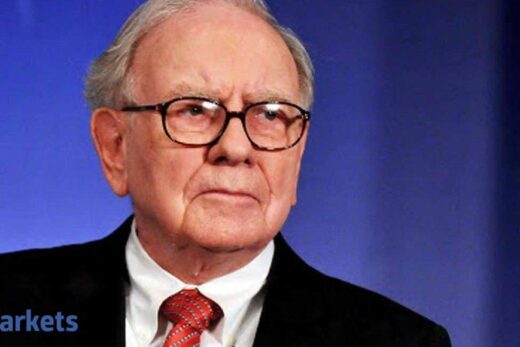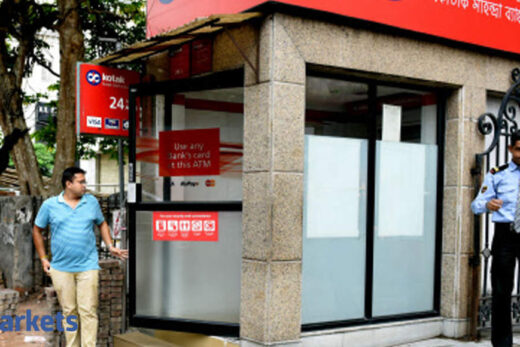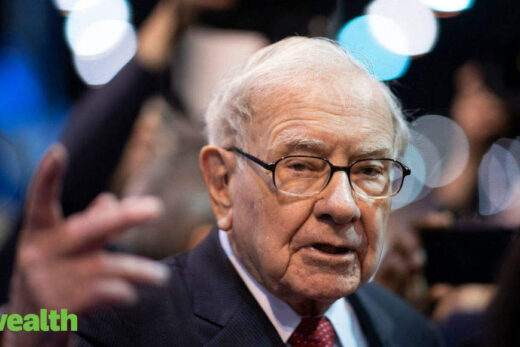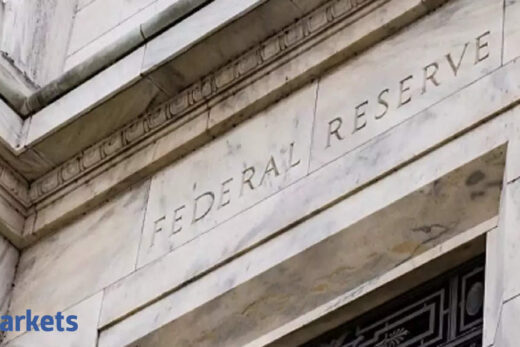Warren Buffett is feeling much better since “the economy went off a cliff” last March. He admits he might be even happier if he had used that opportunity to invest some of the $145 billion of cash Berkshire Hathaway Inc. has been hoarding.
Berkshire revealed that it sold stocks again last quarter, bringing the total net value of equities it has dumped since the outset of the Covid-19 pandemic to more than $12 billion. The benchmark S&P 500 index returned about 26% over that span — double what Berkshire shares did. And as Apple Inc. gained 80%, becoming a $2 trillion company, Berkshire sold some of its Apple shares. That was a mistake, Buffett said, to which his longtime business partner Charlie Munger resoundingly (if half-jokingly) declared, “Yes!” The two say they’ve never had a fight in their sixty-plus years working together, but in that moment their cute claim seemed slightly less plausible.
 Bloomberg
Bloomberg“Looking back, definitely we could’ve done things better,” Buffett said, because many businesses sprang back astonishingly fast. That was thanks to the Federal Reserve’s extraordinary actions early on, which Buffett praised, and the relief checks that went to Americans, he told virtual listeners of his company’s annual shareholder meeting Saturday. Investing is “not as easy at it sounds,” he added, words of caution to the new generation of investors using commission-free apps such as Robinhood that encourage a casino-like trading experience. Buffett, who at 90 is still a voracious reader of companies’ annual reports, is looking forward to reading Robinhood Markets Inc.’s document when it files to go public.
Though visibly older, Buffett was much more chipper this year, partly because he was reunited on stage with Munger, 97, who didn’t take part in last year’s virtual meeting because of Covid travel risks. Alongside them were the two executives seen as the next “Warren and Charlie”: Greg Abel, who oversees everything non-insurance at Berkshire, and Ajit Jain, who Buffett called a “symphony conductor” of the insurance operations. Their presence seemed to set up the formal succession announcement shareholders have long dreaded and long expected; however, it didn’t come.
Buffett may not be ready to step aside just yet, but the billionaire also isn’t ready to jump back into the dealmaking game — SPACs have ruined it for him. These controversial investing machines, driven by a mandate to make splashy acquisitions in a hurry, could easily outbid a bargain-seeking Buffett. “It’s a killer,” he said. “When the competition is playing with other people’s money, they’re going to beat us. That’s a different game.”
“Godawful” is the adjective Munger used for SPACs, though that may be a step up from calling them “s—t” earlier this year. Other choice words he sprinkled throughout the event were “deeply wrong,” “immoral” and “disgusting” — whether in regard to SPACs, Robinhood or Bitcoin. What’s strange is that when it comes to climate change, diversity and Big Tech’s monopoly power, Buffett and Munger’s attitude is that they almost don’t see what the big deal is. It’s what makes the nonagenarians seem out of touch with the issues important to millennials and today’s youth — something that may be of greater consequence than just favoring value stocks over growth.
Amid the substantial push in so-called ESG investing and for corporations to disclose diversity and climate-impact statistics, Buffett sees it as a waste of time to demand that the dozens of smaller Berkshire businesses — such as Dairy Queen, Businesswire, Borsheims and See’s Candies — fill out such reports. In fact, two shareholder proposals related to these issues failed the proxy vote. There was also no mention of the racial-justice protests of the past year. At Berkshire, all six of the top leaders (including Buffett’s investing lieutenants Todd Combs and Ted Weschler) are men, and five of the six are white.
On climate, Abel stressed that just two subsidiaries — Berkshire Hathaway Energy and the BNSF freight railroad — have by far the biggest carbon footprint within the conglomerate, and he outlined their goals in keeping with the Paris Agreement. By 2030, the energy business’s emissions will be cut by 50%, and all its coal plants will be closed by 2050. It’s been investing heavily in high-voltage transmission lines to support renewable-energy projects.
 Bloomberg
BloombergMunger also touched on income inequality, saying, “Bernie Sanders has basically won. He did it by accident, but he won.” He was referring to the hot markets produced by monetary and fiscal policy and low interest rates and how it will make it that much harder for millennials to earn the riches of past generations, effectively shrinking the income gap with those coming up behind them. As for all the money pumped into the U.S. economy by the Fed and fiscal policy, “So far, we have had no unpleasant consequences from it,” Buffett said. “People who get the money feel better. It causes stocks to go up. It causes businesses to flourish. It causes an electorate to be happy.” He added, somewhat ominously, “We’ll see if it causes anything else.”
So far, it has: Berkshire is beginning to see the inflationary effects, along with everyone else. Prices of raw materials are going up, as are prices of other goods. And the global supply-chain snarl — the causes of which can be traced to everything from the pandemic to a ship getting stuck in the Suez Canal and Texas’s February freeze — haven’t discouraged consumer spending. With international air travel still likely a long ways from a revival — a reality that’s painful to Berkshire’s Precision Castparts aerospace-supply business, its last major acquisition — consumers are shopping at places like Berkshire’s Nebraska Furniture Mart, even knowing that delivery could be months off. The “anything else” Buffett spoke of might just be an overheated economy.
Indeed, Berkshire generated $7 billion in operating earnings last period, making it one of the company’s second-best quarter ever. See’s Candies, a California-based chocolates business that was completely paralyzed by Covid lockdowns for a time, had its best first quarter ever. If that’s not a sign of the times, I don’t know what is.
For Buffett, the debates over him losing his touch will go on, but for now he’s said his piece. Another Berkshire meeting is in the books — and it just won’t be the same when he’s not here to preside.



